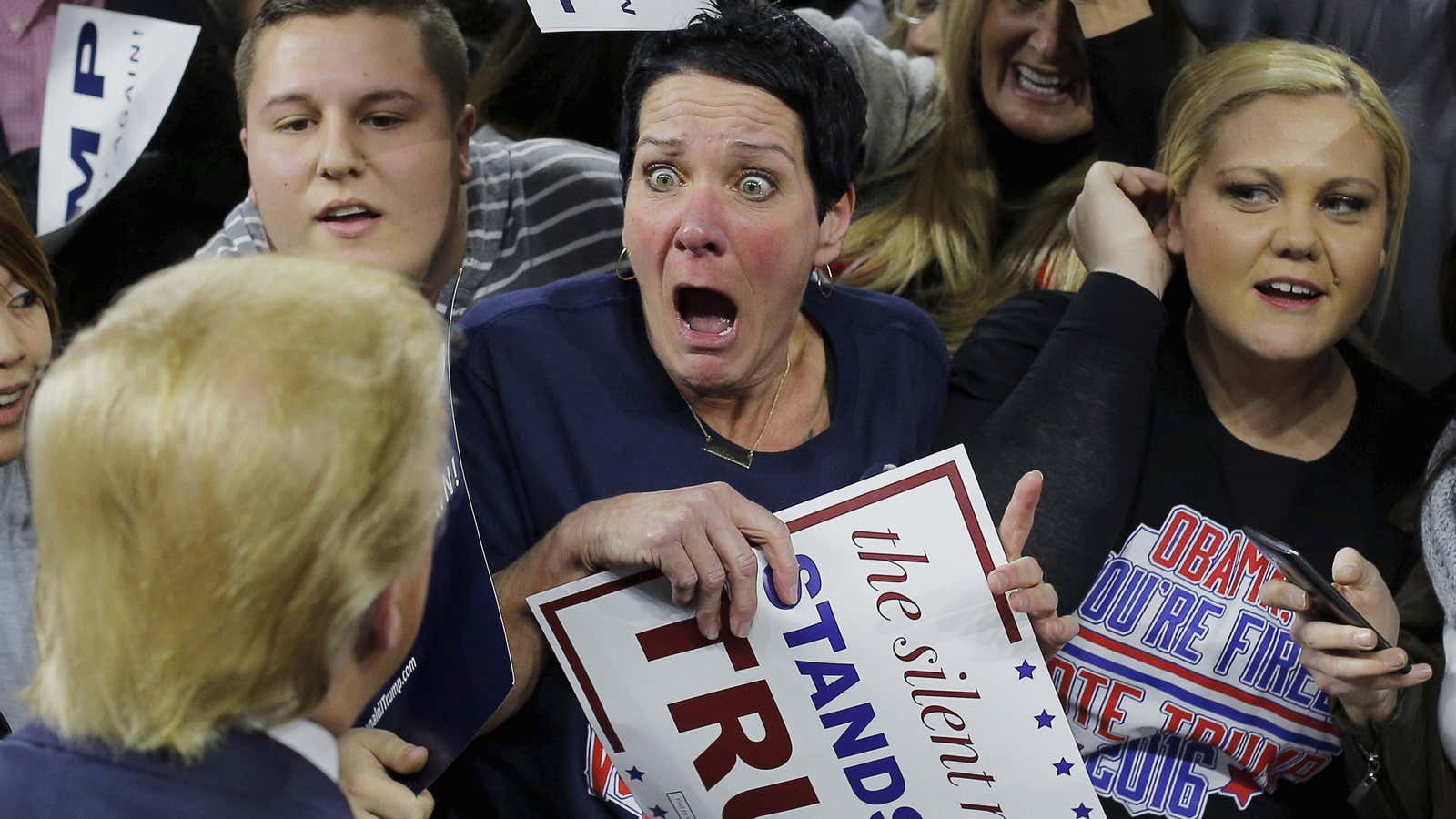How far can you go in condemning a politician without condemning the people who support him? It’s a question Republicans are wrestling with a lot these days.
Donald Trump’s rivals for the GOP nomination, desperate to win over his many admirers, are currently engaged in an intricate dance as they attempt to attack him without attacking his supporters. In politics, voters identify closely with their chosen candidate and their policies. The question then becomes how to criticize Trump’s character without also criticizing the character of his ardent followers—a sizable 37% of Republican voters, according to the latest polls.
At last week’s GOP presidential debate, moderator Neil Cavuto couldn’t resist asking the question. When Jeb Bush repeated his accusation that the Republican frontrunner was “unhinged” for his proposed ban on Muslims entering the US, Cavuto observed that Trump’s poll numbers had actually gone up since his controversial proposal. “Are you saying that all those people who agree with Mr. Trump are unhinged?” he prodded Bush.
The former governor of Florida frantically tried to put a lid on that idea—“No, not at all, absolutely not.” But the question hung heavily in the air. It’s hard to see how Trumpians can escape the characterization. Bush’s attempt to let them off the hook sounded pretty disingenuous—as though voters are somehow less responsible than candidates for the views they hold. Attempting to backtrack, he expressed sympathy for Trump’s misguided supporters: “I can see why people are angry and scared.” In the context of the discussion, “angry” and “scared” sounded like polite epithets for “white” and “racist.”
Nevertheless, Bush’s strategy turned out to be a popular one over the course of the debate, with Ted Cruz and Marco Rubio similarly voicing their “understanding” of Americans’ fear without endorsing Trump’s ban. John Kasich, who has called Trump’s ideas “crazy” in previous remarks, refrained from repeating the charge. Clearly, Trump’s rivals remain profoundly wary of critiquing him, presumably for fear of offending his fan base.
This delicate if transparent finessing epitomizes the flawed nature of attempts to best Trump so far. It’s also what has made the GOP primary such an unpleasant spectacle, especially for more moderate voters. Instead of outright rejecting Trump’s proposals as unconstitutional and undemocratic, the candidates have continued to patronize voters, treating them like confused children who should be forgiven for not knowing better. Instead of condemning xenophobia, they pander to it. And with each passing day, Trump’s ideas become more and more mainstream.
Yet this tactic is also not working. Trump’s rivals, especially the establishment candidates like Bush, Rubio, and Kasich, are having little success wooing Republican voters. Conservatives, at least the conservatives participating this early in the primary process, don’t want a watered-down version of Trump. They want the original, undiluted. So what are GOP candidates to do?
“Every US presidential election is a debate about the character of the American people,” The New Yorker’s Jill Lepore wrote on Jan. 19. While there’s a lot of time left before November, a troubling subset of the American people is looking increasingly angry (read: white), scared (read: racist), and yes, unhinged (read: unhinged). As British lawmakers put it Monday during parliamentary discussions about whether they should bar Trump from entering the UK, Trump’s ideas are “bonkers.”
In some ways, the damage to America’s reputation abroad is already done. After US president Barack Obama spent the first years of his presidency repairing the frayed relations he inherited from the Bush administration, it’s dismaying to see the country already veering back toward aggression and authoritarianism.
The good news is that while Sarah Palin’s endorsement of Trump in Iowa this week is a reminder that this faction never really went away, all signs suggest that it will, eventually. In the two decades before the 2004 election, young people voted Democrat and Republican in equal numbers. Since then, however, millennials have overwhelmingly favored the Democratic Party.
It’s a waiting game, and America’s unhinged are ultimately slated to fade away. For now, however, the rabid voices of these “right-wingin’, bitter-clingin’ proud clingers,” to borrow Palin’s apt phrasing, are ringing loud and clear. And GOP candidates who allow such sentiments to go unchecked and unchallenged are making the problem worse. We may be listening to the desperate cries of an endangered species. But this makes them no less alarming or powerful.
